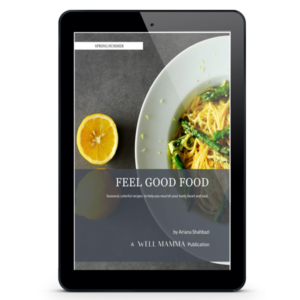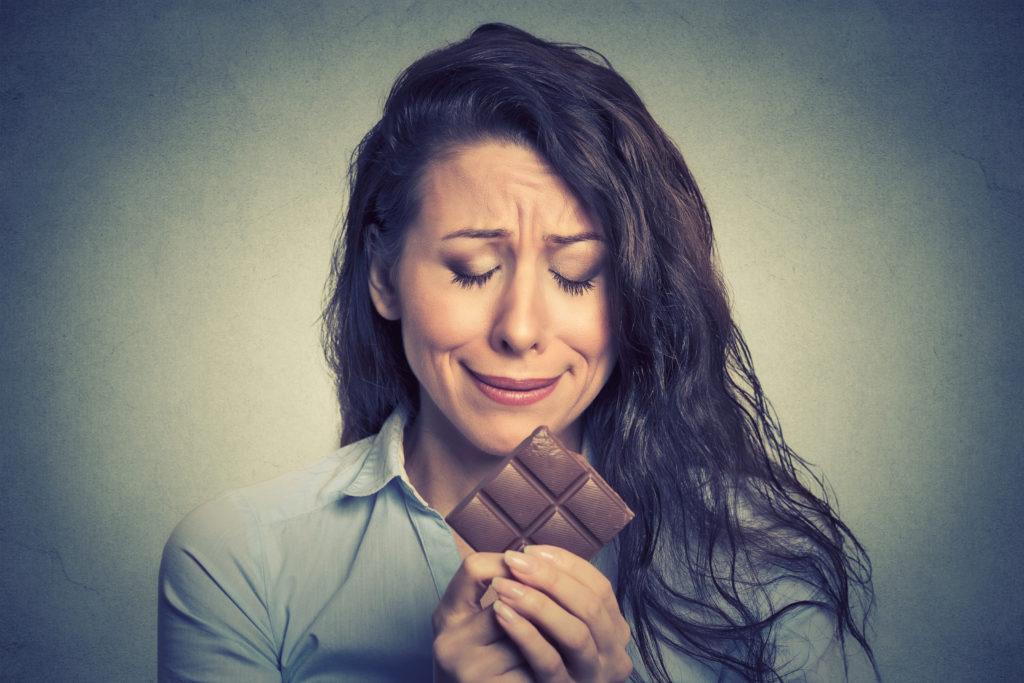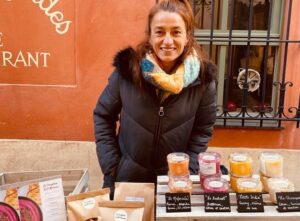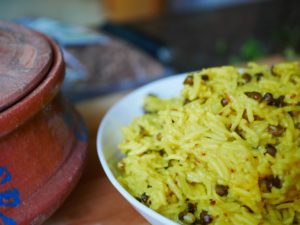These days, there are so many eating philosophies and lifestyles that you really don’t really know what is better, best or worst. Some swear by paleo while others wouldn’t dream of being anything but vegan and both have great arguments that are backed up by studies. And of course, there are some who live by the idea that you need to a variety of whole foods and the rest in moderation. But what if you try all these things and your digestive or weight problems still don’t get resolved?
How do you explain that sometimes, you eat something that goes down really well and a month later, you eat the exact same thing and it’s a disaster? Is it the food item itself, is it the food you ate before or after it, how much you slept, or something else? The truth is, there are loads of reasons, but today, I want to focus on one we often ignore: our state of mind. Yep, our emotions, our thoughts and all the other stuff that goes on when we eat. For this, I am very excited to introduce you to Laura Holland, the founder of BeU. I first saw her on Instagram and was pretty perplexed by her intuitive approach to nutrition. As I’ve gotten to know her, I can tell you she’s definitely onto something. And if you’ve tried everything to solve your health issues and still haven’t gotten it to the bottom of it, maybe Laura’s insight can help.
WM: What is your background?
LH: I started my career as an economist in the UK. On a personal level, I had weight management and nutritional issues and became really interested in the topic. Eventually, this led me to becoming a registered nutritionist and nutritional therapist. I began practicing in Dubai 9 years ago. Originally, I used a very textbook, analytical approach based on my training, but over time, it evolved into a more intuitive one that also takes people’s emotions, experiences and relationship with food into account.
WM: Tell us more about this intuitive approach. How did it come about?
LH: I’ve always had a highly analytical, numerical and quantifiable way of looking at things given my background; and when I began working as a nutritionist, I used the data-driven, empirical-based approach I was taught: measuring calories, looking at the quality and quantity of food intake, prescribing various tests to understand identify intolerances, etc. However to my great irritation, although my clients’ symptoms would improve, they wouldn’t entirely disappear and their bodies wouldn’t necessarily react the way the textbooks and research said. In fact, we would very often realize that their “food” issue was linked to a lot of other factors such as hormones and stress. The same happened with me: I initially treated my own body with this analytical technique and it just didn’t do what it should have given the formula I was giving it. I didn’t feel like we got to the heart of the problem. This was exacerbating because despite all the knowledge acquired from my studies, books and available research, I still couldn’t understand the lack of long-term results both for myself and my clients.
Over the years, I threw away these empirical approaches and started tapping into what people’s bodies were trying to say and how they intuitively felt with regards to the food they were eating. For example, now if someone comes with a bloated stomach, yes, there is most probably a problem with regards to what they are consuming – an irritant of some sort – but I guarantee you, there is almost always something else as well. It’s not merely the food we put into our body but also the energy, thoughts, beliefs and/or experiences as well. There is something going into the equation other than food. Unless you dig deeper into those emotional roots, you are only scratching the surface of the issue and not really solving anything. In the end, a healthy diet cannot override and unhealthy emotional state.
People are increasingly conscious that what they eat affects their physical body, but how we feel, our state of mind and emotional state also affect how we process food. Being conscious of this pushes us towards improved emotional balance and in turn, this allows us to make better dietary decisions. Food is medicine but thoughts cure. An emotional state that is balanced and healthy is the best environment for your physical body to be healthy.
WM: Practically speaking, how do you help clients get to the bottom of their problems?
LH: It is different for everybody and that is part of the process. I approach people individually because digging deep into emotions is completely different from one person to the next. That is how I came up with my brand “BeU“. I want to help people connect to their bodies. They need to tune into with themselves and develop a stronger connection with their gut instinct. Once you do that, you trust yourself more and develop a feeling of safety and security.
So for example, I ask clients to do a food diary where they not only register what they eat but also how they feel about that meal. Most people start with the physical symptoms – heavy, unwell, bloated, etc. – but I also ask them to look at their emotions and state of mind. Once they do, they often often start seeing behavioral or emotional patterns that are associated with their eating. Once we understand how they are feeling I can help them connect the dots between that, what they are eating and how their body is reacting to it.
WM: Does guilt often come up as an emotion that’s closely linked to food?
LH: Absolutely. I like to use the example of the girls in the Starbucks queue. One sees a blueberry muffin, feels like having it, orders, eats and enjoys it. She’s usually the one who doesn’t have a particular weight/digestive/nutritional or body image issue. Then there’s the girl who sees the muffin and spends a couple of minutes debating whether or not she should have it. She ends up getting it, eats it, feels slightly guilty and probably doesn’t digest it as well. Oftentimes, she’s the one with the issues.
Guilt is very common, a lot of people have a certain level of guilt before, during or after eating. Especially these days with all the “clean” diet regimens everyone is trying to adopt. Guilt becomes a habit.
WM: Do you suggest basic dietary guidelines? Or can we eat lots of sugar and bad fats as long as we feel good about it?
LH: Whatever you eat, make sure you love it and that it is going to love your body back. Always eating something you know will harm you will produce guilt and do damage – ignorance is bliss but when you know better and you don’t do better, it’s a complete disaster as far as your body is concerned.
Also, intention is key – if your intention is to nourish your body, you won’t eat white sugar all the time for example. White sugar plays havoc with insulin, pancreas, mood and energy – a lot of people actually don’t feel good emotionally after they have eaten it. Also, processed foods, preservatives, chemicals, most vegetable oils, anything that is hydrogenated – all these are things your body does not biologically recognize and will cause a toxic load on your system which quite frankly given today’s environment, you do not need to deal with.
WM: What is the scientific basis of this intuitive eating approach?
LH: Often, people hear the word “emotion” and think it’s very airy fairy, but there is a lot of science that backs up the connection between our digestion and our mind:
- The vagus nerve connects our guts to our brain. What goes on in the gut affects how you feel and vice versa.
- Our emotions and thoughts can have a huge impact on the chemicals we produce, including our hormones, which in turn affect our metabolism and a host of other things. Also, there are hormones like serotonin which is important with regards to mood and most of it is produced in our gut.
- Your body is vibrational energy. Food is vibrational energy, so are thoughts and emotions. It’s not hocus pocus, it’s science, measurable quantifiable science. All of those things converge and react and respond and form a relationship. The result of that reaction is how you feel, how your body looks and so you cannot take one thing out of your body. Everything happens together and you can’t just isolate and work on one thing to have an impact. You know it, when you feel nervous you have a physical sensation, when you get angry, you get a physical effect. We’ve all had experience of it, we are so used to it we have become blind to what it is. Your emotion is being translated in a physical sensation, you feel it.
Some people get on board right away while some are fearful of listening to their body. Everyone in their own time. Our work together is a journey, it’s a collaborative experience and we are just using your body’s biofeedback to see what we need to be doing every step of the way.
WM: What’s an issue that comes up often with clients?
LH: People come to me for a variety of health concerns: auto-immune disorders, infertility, weight management, eating disorders, etc. But 9 times out of 10 the root cause of the dis-ease someone is facing is a lack on some level of self-love and it manifests into a physical issue such as weight gain. The way we are treating ourselves is not in harmony with who we really are and in the long run that causes disease.
You need to get to the root of it: why do you feel a certain way while eating specific things or meals? It is an experience? Something you heard/saw? Running away from your emotions is a bad idea. You need to ask yourself why. By understanding and entering into a dialogue with yourself and understanding these causes, you can unravel the knots created in your mind gradually put some conscious effort to changing it. And everyone is different when it comes to the tools they use – from positive affirmations to yoga, you need something that suits you. Meditation is hugely popular because it’s been proven scientifically that it affects your thoughts, stress levels, and hormones.
WM: If you could just give one piece of advice to people when it comes to food and diet?
LH: Stop asking “whats wrong with my body?” Instead, ask “what is my body trying to tell me?”. It is so simple yet so crucial – everyone skips straight to food – but often, they are stressed, aren’t even breathing well or sleeping properly.
As mentioned earlier, a healthy diet cannot override a poor emotional state when it comes to your physical wellbeing.

Find out more about Laura Holland and BeU
If you would like to do a Skype session with Laura or just find out more about her intuitive eating approach, connect with her:
Website: www.laura-holland.com
Twitter: @BeUtifulLaura
Instagram: @love.beu




